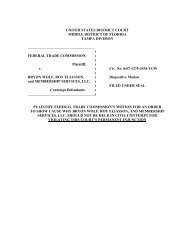HELO RCPT TO QUIT MAIL FROM DATA - Federal Trade Commission
HELO RCPT TO QUIT MAIL FROM DATA - Federal Trade Commission
HELO RCPT TO QUIT MAIL FROM DATA - Federal Trade Commission
Create successful ePaper yourself
Turn your PDF publications into a flip-book with our unique Google optimized e-Paper software.
<strong>Federal</strong> <strong>Trade</strong> <strong>Commission</strong><br />
Another way to understand the intent of a law is to look at who opposed it. In the instance<br />
of mandatory ADV labeling, it was not “Kingpin Spammers” and other Internet miscreants.<br />
Instead, legitimate marketers – some of whom supported the fraud and deception provisions<br />
in CAN-SPAM – opposed the labeling requirement (and threatened to block the underlying<br />
measure). Simply put, they worried that consumers would not read ADV-labeled emails.<br />
Ultimately, Congress replaced the mandatory labeling requirement that some legislators had<br />
endorsed with a provision authorizing the <strong>Commission</strong> to study ADV labeling. It is telling,<br />
though, that the report provision directs the <strong>Commission</strong> to examine the ADV label’s application<br />
for a broader range of email than all unsolicited commercial email – all “commercial email,”<br />
presumably whether unsolicited or not.<br />
Congress’ interest in ADV labeling as a tool to deal with email from legitimate marketers is<br />
well-founded. It is not clear that consumers want unsolicited commercial email from legitimate<br />
marketers any more than they want, say, unsolicited telephone calls. According to Senate<br />
Judiciary Chairman Leahy, for example,<br />
the fundamental problem adherent to spam – its sheer volume – may well persist even<br />
in the absence of fraudulent routing information and false identities. In a recent survey,<br />
82 percent of respondents considered unsolicited bulk email, even from legitimate<br />
businesses, to be unwelcome spam.<br />
108 th Congress, Cong. Rec. S15947 (daily ed. Nov. 25, 2003) (statement of Senator Leahy). An<br />
ADV label, of course, would simply alert the consumer that the email is commercial in nature<br />
– it would not prevent consumers from receiving or reading ADV-labeled offers. The Report<br />
suggests that if labeling were mandatory, ISPs would use the labels to filter email, but that has<br />
not proven to be the case. As the Report makes clear, very few ISPs have used the ADV label to<br />
filter, and there is no reason to think that they would start doing so if Congress mandated the use<br />
of ADV labels.<br />
By focusing mainly on the minor impact of ADV labeling on deceptive and fraudulent spam<br />
rather than on its significant impact on unsolicited commercial email from legitimate marketers,<br />
the <strong>Commission</strong>’s Report gives short shrift to the area where a labeling requirement is likely to<br />
be most promising. Thanks to the great strides made by industry, notably the ISPs, in filtering<br />
email before it reaches individuals’ in-boxes, email from legitimate marketers who would likely<br />
comply with an ADV labeling requirement makes up an ever-increasing percentage of the mail<br />
that reaches consumers. ADV labeling would not solve all of the problems consumers face in<br />
weeding out unwanted mail, to be sure, but it would give consumers additional flexibility to deal<br />
with them. It could save consumers time and money (for those with dial-up access), increase<br />
convenience, and – with apologies to Justice Brandeis – help protect the “right to be left alone”<br />
in the digital age. To avoid labeling, imaginative marketers seeking to establish a relationship<br />
with customers might even come up with incentives to persuade people to opt-in to email offers.<br />
I do agree with my colleagues that an ADV labeling requirement would likely have little<br />
impact in assisting the <strong>Commission</strong> in enforcing the law or in reducing the amount of deceptive<br />
and fraudulent spam that consumers receive. I recognize, also, that consumers have other tools<br />
available that are designed to give them more control over their in-boxes, including filters and<br />
2

















